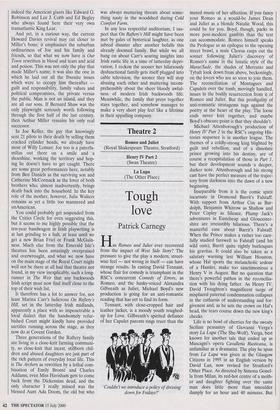Theatre 1
All My Sons (National)
On Raftery's Hill (Royal Court)
Miller's tale
Sheridan Morley
Attention, as Willy Loman's widow says in Death of a Salesman, must be paid: and if that play is not the greatest of the last half-century then All My Sons is, and both were written within three years of the end of the second world war by Arthur Miller.
The new production of All My Sons at the Cottesloe does not in any way compare with the definitive Michael Blakemore revival of 1981, largely because in the cen- tral role James Hazeldine, though infinitely pitiable, desperately lacks the bull-necked charisma of the late Colin Blakely, or indeed the American giants like Edward G. Robinson and Lee J. Cobb and Ed Begley who always found here their very own transatlantic King Lear.
And yet, in a curious way, the current Howard Davies revival may cut closer to Miller's bone; it emphasises the suburban ordinariness of Joe and his family and friends, so that what we now have is Our Town rewritten in blood and tears and acid and poison. This was not only the play that made Miller's name; it was also the one in which he laid out all the Ibsenite issues which were to occupy him thereafter — guilt and responsibility, family values and political compromises, the private versus the public. Man is not an island, and they are all our sons. If Bernard Shaw was the only playwright seriously worth following through the first half of the last century, then Arthur Miller remains his only real successor.
In Joe Keller, the guy that knowingly sent 21 pilots to their death by selling them cracked cylinder heads, we already have most of Willy Loman: Joe too is a paterfa- milias out there on a smile and a shoeshine, working the territory and hop- ing he doesn't have to get caught. There are some great performances here, notably from Ben Daniels as the surviving son and Catherine McCormack as the lover of both brothers who, almost inadvertently, brings death back into the household. In the key role of the mother, however, Julie Walters remains as yet a little too mannered and unAmerican.
You could probably get suspended from the Critics Circle for even suggesting this, but it seems to me highly possible that the ten-year bandwagon in Irish playwriting is at last grinding to a halt, at least until we get a new Brian Friel or Frank McGuin- ness. Much else from the Emerald Isle's theatres has been amazingly overpraised and overwrought, and what we now have on the main stage of the Royal Court might well not be there at all had that theatre not found, in my view inexplicably, such a long- runner in The Weir that any backwoods Irish script must now find itself close to the top of their wish list.
It therefore has a lot to answer for, not least Marina Carr's ludicrous On Raftery's Hill, set in the latterday Irish midlands, apparently a place with so impenetrable a local dialect that the handsomely refur- bished Court might kindly have provided surtitles running across the stage, as they now do at Covent Garden.
Three generations of the Raftery family are living in a close-knit farming communi- ty, so close-knit that incest, stillborn chil- dren and abused daughters are just part of the rich pattern of everyday local life. This is The Archers as rewritten by a lethal com- bination of Emily Brontë and Charles Addams; even Miss Havisham gets to come back from the Dickensian dead, and the only character I really missed was the blessed Aunt Ada Doom, the old bat who was always muttering threats about some- thing nasty in the woodshed during Cold Comfort Fann.
In any less respectful auditorium, I sus- pect that On Raftery's Hill might have been met by gales of hysterical laughter, as one inbred disaster after another befalls this already doomed family. But while we all bang on about Carr's searing insights into Irish rustic life in a time of latterday depri- vation, I reckon the sooner her hilariously dysfunctional family gets itself plugged into cable television, the sooner they will stop abusing each other and muttering incom- prehensibly about the sheer bloody awful- ness of modern Irish backwoods life. Meanwhile, the family that preys together stays together, and somehow manages to make a very short play feel like a lifetime in their appalling company.



























































 Previous page
Previous page